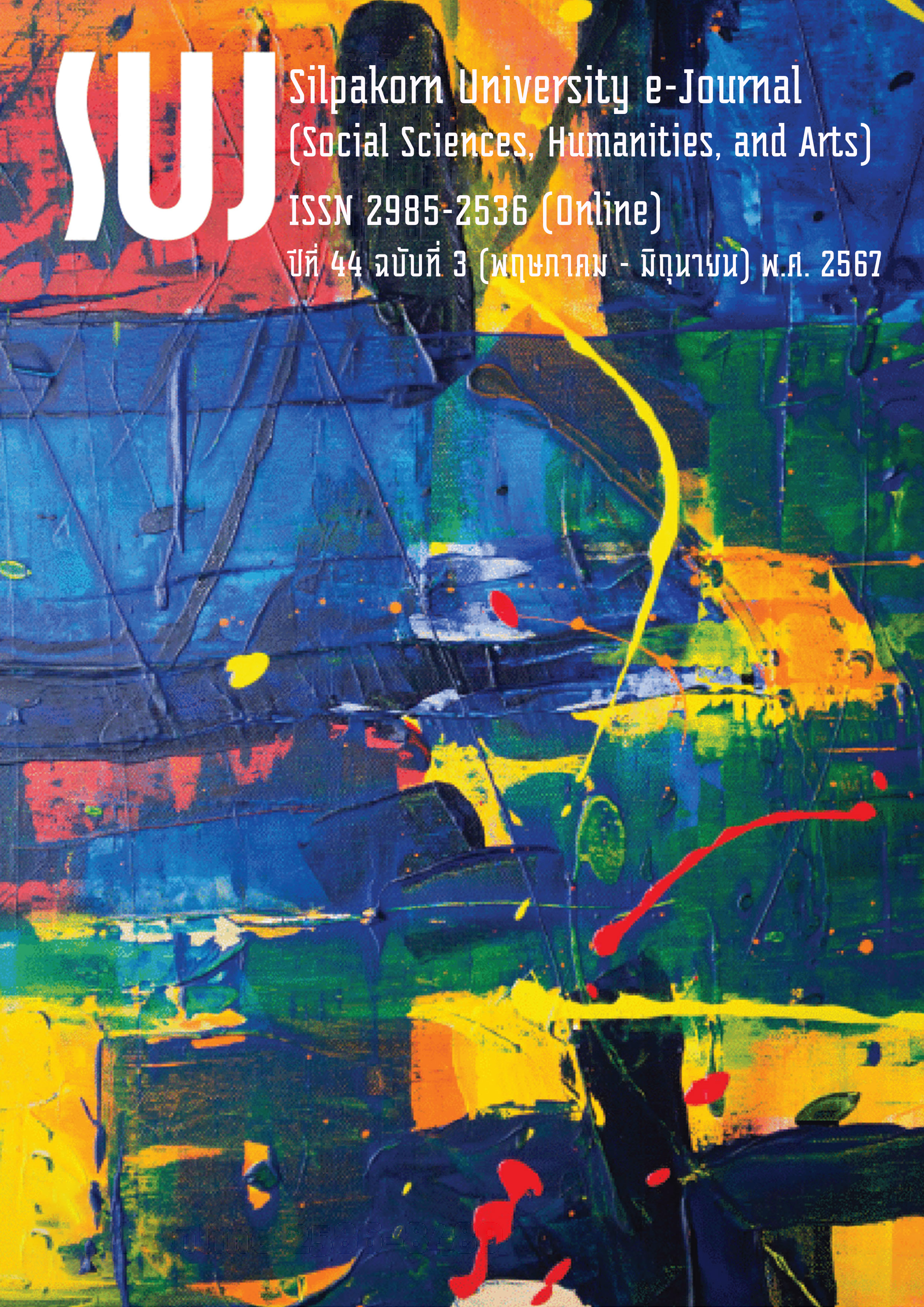แนวทางการแก้ไขปัญหาการเข้าใช้พื้นที่ “ถนนคนเดินเขมราฐ” ภายใต้การกำกับดูแลของเทศบาลตำบลเขมราฐ อำเภอเขมราฐ จังหวัดอุบลราชธานี (Approaches to resolving space utilization issues at the “Khemarat Walking Street” under the Governance of the Khemarat Subdistrict Municipal Authority, Khemarat District, Ubon Ratchathani Province)
Main Article Content
Abstract
การศึกษาวิจัยนี้เริ่มต้นจากการทบทวนสถานการณ์และปัญหาการเข้าใช้พื้นที่ถนนคนเดินเขมราฐ ประกอบกับการทำความเข้าใจถึงบทบาทของเทศบาลที่มีภารกิจในการสนับสนุนเศรษฐกิจท้องถิ่นและการอนุรักษ์มรดกทางวัฒนธรรมซึ่งมีความท้าทายต่อการปรับตัวให้เข้ากับความต้องการร่วมสมัย โดยใช้วิธีการวิจัยเชิงคุณภาพในการสัมภาษณ์กับผู้บริหาร ผู้จำหน่ายสินค้าและนักท่องเที่ยวที่เข้ามาร่วมกิจกรรมในพื้นที่ จำนวน 25 คน เพื่อนำมาวิเคราะห์เชิงพรรณนาตามข้อเท็จจริงเชิงตรรกะ ผลการวิจัยพบว่า แม้ตลาดถนนคนเดินเขมราฐจะประสบความสำเร็จในการส่งเสริมวัฒนธรรมและเศรษฐกิจท้องถิ่น ดังที่เห็นได้จากกระบวนการส่งต่อองค์ความรู้ทางภูมิปัญญาจากรุ่นหนึ่งสู่รุ่นหนึ่ง แต่ยังมีช่องว่างในการมีส่วนร่วมของประชาชนที่จำเป็นต้องพิจารณาถึงบทบาทของเทศบาล โดยมุ่งเน้นถึงการดึงศักยภาพของคนในชุมชนออกมาเพื่อจัดการกับปัญหาที่มีอยู่ในพื้นที่ร่วมกัน ทั้งนี้ ข้อเสนอแนะเชิงนโยบาย คือ ภาครัฐควรสนับสนุนให้องค์กรปกครองส่วนท้องถิ่นมีกรอบในการจัดการพื้นที่สาธารณะเพื่อนำไปสู่แนวทางการปฏิบัติที่ยั่งยืน ส่วนข้อเสนอแนะเชิงปฏิบัติ คือ เทศบาลตำบลเขมราฐควรเพิ่มกระบวนการมีส่วนร่วมสาธารณะผ่านแพลตฟอร์มดิจิทัลเพื่ออำนวยความสะดวกให้แก่ประชาชนมีความรู้สึกถึงความเป็นเจ้าของพื้นที่ร่วมกัน ตลอดจนมีการเปิดตัวโครงการขยะยั่งยืนเพื่อลดปริมาณขยะจากการดำเนินกิจกรรมในพื้นที่อย่างเป็นรูปธรรม ผลการศึกษาที่ได้จะเป็นแนวทางในการแก้ปัญหาให้กับพื้นที่อื่น ๆ ต่อไป
This study examined the situation and issues surrounding the utilization of Khemarat Walking Street, exploring the role of municipalities tasked with supporting the local economy and preserving cultural heritage amid challenges in adapting to contemporary needs. Qualitative research methods were employed, involving interviews with executives, product sellers, and tourists engaged in activities in the area, totaling 25 participants. The data were subjected to descriptive analysis grounded in factual evidence. The research findings indicate that while Khemarat Walking Street has succeeded in promoting local culture and economy, as evidenced by the transmission of intellectual knowledge across generations, there are still gaps in public participation that warrant consideration of the role of municipalities. Emphasis was placed on mobilizing community members to collectively address area-specific issues. Regarding policy recommendations, the government should assist local administrative organizations by providing a framework for managing public spaces to ensure sustainable practices. Practically, the Khemarat Subdistrict Municipality should enhance public participation through digital platforms to foster a sense of ownership among residents. Additionally, launching a sustainable waste management project would effectively reduce waste generated from activities in the area. The result of the study will serve as guidelines for addressing problems in other areas in the future.
Downloads
Article Details

This work is licensed under a Creative Commons Attribution-NonCommercial-NoDerivatives 4.0 International License.
References
Balane, M. A., Palafox, B., Palileo-Villanueva, L. M., McKee, M., & Balabanova, D. (2020). Enhancing the use of stakeholder analysis for policy implementation research: Towards a novel framing and operationalized measures. BMJ Global Health, 5(11): e002661.
Baobeid, A., Koç, M., & AI-Ghamdi, S. G. (2021). Walkability and its relationships with health, sustainability, and livability: Elements of physical environment and evaluation frameworks. Frontiers in Built Environment, 7: 721218.
Chandratri, Wansika, & Sripokangkul, Siwat. (2018). Cultural tourism in line with local sustainable development: A case study of Khemarat District, Ubon Ratchathani Province (การท่องเที่ยวเชิงวัฒนธรรมที่สอดคล้องกับการพัฒนาท้องถิ่นอย่างยั่งยืน กรณีศึกษา อำเภอเขมราฐ จังหวัดอุบลราชธานี). RMUTI Journal Humanities and Social Sciences, 5(1): 116-132.
Chang, C. M., Salinas, G. T., Gamero, T. S., Schroeder, S., Canchaya, M. A. V., & Mahanz, S. L. (2023). An infrastructure management humanistic approach for smart cities development, evolution, and sustainability. Infrastructures, 8(9): 127.
Fei, X., & Mao, B. (2020). Study on the strategy of urban small public space planning based on the concept of park city-take the old town of Jiangling county in Jingzhou as an example. Current Urban Studies, 8(1): 107-114.
Food and Agriculture Organization of the United Nations. (2022). Regional Knowledge Platform on One Country One Priority Product (OCOP) in Asia and the Pacific. [Online]. Retrieved May 25, 2024 from https://www.fao.org/family-farming/detail/en/c/1608145/
Hudson, B., Hunter, D., & Peckham, S. (2019). Policy failure and the policy-implementation gap: Can policy support programs help? Policy Design and Practice, 2(1): 1-14.
Kaewphet, Ruengsak, & Wanjang, Sisikkka. (2019). Management of cultural tourism areas in Khemark. Ubon Ratchathani (การจัดการพื้นที่ท่องเที่ยวในมิติวัฒนธรรมเมืองปลายแดนเขมราฐ จังหวัดอุบลราชธานี). Journal of MCU Social Science Review, 8(1): 252-262.
Khan, A. R. (2016). Policy implementation: Some aspects and issues. Journal of Community Positive Practices, 16(3): 3-12.
Khemarat Subdistrict Municipality. (2021). Development Plan (แผนการพัฒนา). [Online]. Retrieved March 10, 2024 from https://shorturl.asia/oPqQk
Magalhães, C. D., & Carmona, M. (2006). Innovations in the management of public space: Reshaping and refocusing governance. Planning Theory and Practice, 7(3): 289-303.
Manazir, S. H. (2023). Reimagining public policy formulation and analysis: A comprehensive theoretical framework for public policy. Discover Global Society, 1: 16.
Pradipasena, Arparat, & Khottaphat, Puttaporn. (2022). Development of community potential in service management to support new normal tourists: A case study of walking street of Khemarat Community, Ubon Ratchathani Province (การพัฒนาศักยภาพชุมชนในการจัดการการบริการเพื่อรองรับนักท่องเที่ยวรูปแบบชีวิตวิถีใหม่ กรณีศึกษาถนนคนเดินชุมชนเขมราฐ จังหวัดอุบลราชธานี). Humanities and Social Sciences Journal, Ubon Ratchathani Rajabhat University, 13(2): 194-211.
Recchi, S. (2021). Informal street vending: A comparative literature review. International Journal of Sociology and Social Policy, 41(7/8): 805-825.
Said, M., & Tempels, B. (2023). Challenges in managing public space: Insights from public space management practice. Journal of Environmental Planning and Management, 2023, 1-20.
Salawu, I. A. (2023). The elite theory in the context of public policy making. International Journal of Emerging Multidisciplinaries: Social Science, 2(2): 1-6.
Salvador, M., & Sancho, D. (2021). The role of local government in the drive for sustainable development public policies: An analytical framework based on institutional capacities. Sustainability, 13(11): 5978.
Shayan, N. F., Mohabbati-Kalejahi, N., Alavi, S., & Zahed, M. A. (2022). Sustainable Development Goals (SDGs) as a framework for corporate social responsibility (CSR). Sustainability, 14(3): 1222.
Sukkasame, S. (2019). Collaborative community design processes in rural and urban settlements in Thailand. Nakhara: Journal of Environmental Design and Planning, 17(1): 71-80.
Thapa, I. (2020). Local Government: Concept, Roles and Importance for Contemporary Society. Kathmandu: Public Administration Campus, Tribhuvan University, Nepal.
Udomkerdmongkol, M., & Chalermpao, N. (2024). Thai Agricultural Sector: From Problems to Solutions. United Nations, Thailand. [Online]. Retrieved May 26, 2024 from https://thailand.un.org/en/103307-thai-agricultural-sector-problems-solutions
Vazquez, S. A., Madureira, A. M., Ostermann, F. O., & Pfeffer, K. (2024). Challenges and opportunities of public space management in Mexico. Cities, 146: 104743.


